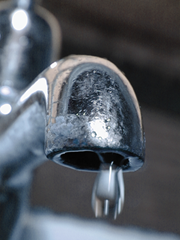Water Charges
 While the Government presses ahead with plans to introduce domestic water charges, clarity is still needed on the finer details. Emma Blee writes.
While the Government presses ahead with plans to introduce domestic water charges, clarity is still needed on the finer details. Emma Blee writes.
Plans to charge for drinking water will take effect when water meters have been fitted to homes throughout the country.
Charges for domestic water were abolished in 1997 but the financial bail-out agreed by the last Government now requires the taxation to be re-instated.
Speaking in the Dáil on 6 April, Minister of State for the Environment Fergus O’Dowd explained that water meters will now be installed in every home in the country. He said every household would have a free allowance for drinking water and would only be charged when this was used up.
Installation is due to start next year and O’Dowd said he understands that “it could take up to three years in total to install water meters in every household.”
The project is expected to initially cost €500 million, with the cash coming from the National Pensions Reserve Fund, but by the time that money and interest is repaid it will cost around €1 billion.
O’Dowd explained that it would be beneficial in the long term because if meters were not installed 5,000 people would need to be employed in repairing burst water mains and other problems.
“From the briefing I have received, approximately 1,800 people will be employed for a period of three years to install meters in every house in the country. I presume that when all of that has happened, there will then be a decision on charging,” he commented.
However, the Minister suggested that it could still be years before customers would receive a bill, stating that charges would not be imposed until usage can be measured in every home.
Although the Programme for Government commits the Fine Gael-Labour coalition to water charges only when the meters have been fitted, the EU-IMF agreement and the poor state of the country’s finances have raised speculation that the plans may have to be pushed through earlier.
The memorandum of understanding with the EU and IMF requires Ireland to start charging for domestic water in 2012 and 2013.
However, a departmental spokesman said: “The Government hasn’t made any decision yet, in relation to the date for the introduction or cost of water charges.”
Speaking about the timeframe for charges, Pat Rabbitte said that the position hasn’t changed from the Programme for Government but ministers will “have to look at all of that as things develop”. He added that the economic situation facing the new Government was much more serious than what it had anticipated before taking office.
Amongst the reforms, O’Dowd announced there will also be a transfer of functions from the 34 local authorities to a new state-owned water utility and this will require “significant legal and administrative changes”.
The Minister said an assessment will now take place on how to establish the new public company, which is expected to be completed in October.
It emerged that while the legislation on introducing water charges was not included in the Government’s list of bills, it is expected to be published over the summer.
O’Dowd said that a standard household charge was the only alternative to water charges but water meters could help the environment as they will also reduce water consumption.
He highlighted that almost half of all clean drinking water produced is lost through the country’s creaking water infrastructure: “One of the major problems is that some local authorities are appallingly bad at the amount of waste water [leakage] that they have. Some of them lost as much as 60 per cent of every drop of water that they initially start off with.”
Fianna Fáil’s Willie O’Dea said he was worried about the effect the plans would have on jobs. He asked if people working in water maintenance in local authorities would lose their jobs as a result of the plan. O’Dowd said it would not make sense to move all 3,000 local authority staff working in that area to the new firm.
However, the party states that “water services investment is a key priority”.
Sinn Féin’s Aengus Ó Snodaigh is critical of the plans. He said the fees could lead to water poverty and the Government’s focus should be improving the water distribution network rather than household meters or charges. “Investment in active leak management and mains rehabilitation would more than pay for itself and indeed quickly generate savings,” he commented.
There has been some support for the Government’s decision though. The National Competitiveness Council argues that broadening the tax base by introducing water charges “is central to repairing the public finances and ensuring adequate investment in these important areas”.
The ESRI also supports water charges in Ireland, describing them as “simple elements in any rational tax system”.
Water charges are a necessary step forward, according to the Organisation for Economic Co-operation and Development (OECD). The organisation argues that “the absence of household water charges impedes the development of an economically, environmentally and socially efficient water services sector”.





